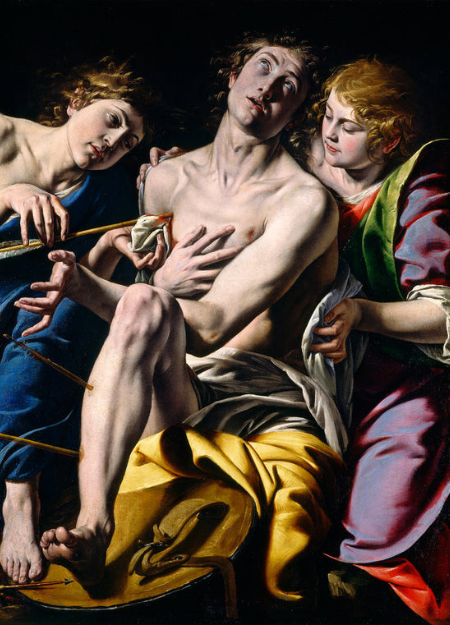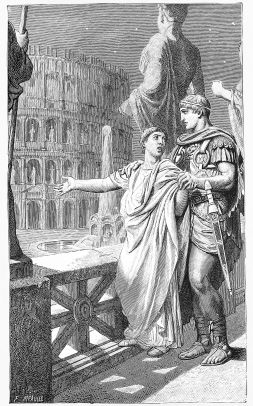Don't miss your chance to invest in 'Fabiola'!
Visit our crowd-funding page for our new production, "Fabiola"!
St. Sebastian – Patron Saint Of Sports And A Highlighted Character In FABIOLA
- Home
- Movies About Roman History
- St. Sebastian
In Cardinal Wiseman’s novel Fabiola, St. Sebastian comes to life in a way unlike any other account I’ve read. The novel captivated me—not just for its gripping storytelling, but for the way every action and word held deeper meaning, a testament to the power of faith and sacrifice.
In Fabiola, Cardinal Wiseman describes St. Sebastian as the perfect embodiment of a noble-hearted youth, full of honor and generous thoughts, yet without a trace of pride. Strong and brave, he is a young man driven not by glory, but by a yearning for the ultimate sacrifice: martyrdom for his faith. Throughout the novel, his life is depicted as one of constant desire for martyrdom, as he seeks to strengthen the faith of persecuted Christians while longing for his own chance to suffer for Christ. As he says in Fabiola, “How long, O Lord, how long?”
As Dom Prosper Gueranger, O.S.B. writes in The Liturgical Year, we must imagine a young soldier leaving behind all the comforts of home in Milan, drawn to Rome where persecution was fiercest. His noble desire to stand alongside fellow Christians, to be their strength in moments of weakness, exemplifies his courage and dedication.
The Two-Fold Crown of Martyrdom

St. Sebastian’s story is one of profound courage, culminating in a two-fold martyrdom. The first time, he faces Emperor Diocletian, who—furious at discovering a Christian within his own ranks—orders Sebastian to be executed by arrows. His aim is to make Sebastian’s death a slow and agonizing one.
However, this leads to a pivotal moment in Fabiola, when Fabiola herself discovers Sebastian miraculously still alive after his execution. Believing she is aiding the man she admires deeply, she spares no cost to ensure his recovery, ensuring that he returns to health.
But for St. Sebastian, survival brings an unexpected agony. Cardinal Wiseman writes poignantly about Sebastian’s feelings after this first martyrdom: “To have yearned after martyrdom, to have prayed for it, to have suffered all its pangs, to have died in it as far as human consciousness went, to have lost sight of this world, and now to awaken in it again, no martyr, but an ordinary wayfaring man on probation, who might yet lose salvation—was surely a greater trial than martyrdom itself.”
For Sebastian, his recovery feels like a stolen martyrdom—a moment of spiritual victory snatched away. Yet, we know he would later confront the emperor once again, this time to meet his final end. Cudgeled to death, St. Sebastian would earn his double martyrdom, taking with him the double palm and twofold crown reserved for the bravest of saints.
St. Sebastian’s True Patriotism

Among St. Sebastian’s many virtues, one that stands out is his sense of true patriotism. This is not the kind of false, blind devotion that we often see, but a deep love for his country that aligns with a greater love for God’s will. In my final year of high school, I spent time studying Catholic principles of government and citizenship. In a book by Frank Denke, I came across a description of patriotism that struck me. True patriotism, it said, is a love of one’s country that seeks to preserve, defend, and build upon the good and beautiful gifts that God has bestowed upon that nation.
St. Sebastian’s patriotism is of this kind. He harbors a sincere love for Rome, even though it is a pagan empire hostile to his faith. His love for Rome doesn’t stem from its current condition, but from his hope for its future transformation—a future where Christianity would flourish. In the early chapters of Fabiola, we see him in conversation with another saint, Pancratius. As they stand before the Arch of Titus, Sebastian speaks of his belief that one day, another arch will rise to celebrate a victory over the heathen Roman Empire, a spiritual victory won through faith rather than force.
When Pancratius asks if Sebastian is advocating the overthrow of Rome, Sebastian quickly clarifies. He would willingly shed his blood to defend Rome from invasion, but the victory he envisions is not a military one. It is a victory of faith, of Christianity triumphing over the empire’s paganism. This moment reveals the core of St. Sebastian’s earthly mission: he is a soldier, yes, but one who understands that a nation’s strength lies not only in its military but also in its spiritual foundation. St. Sebastian embodies both physical courage and spiritual resolve, perfectly balancing the two in a way few could.
True Patriotism Is The Love Of Country Which Pursues The Good In Our Own Broken Nation
A Heroic Example for Us All
St. Sebastian’s story of unwavering faith and courageous martyrdom resonates deeply with those seeking strength in their own lives. As Prof. Plinio Corrêa de Oliveira writes, “The glory of St. Sebastian is the glory of the warrior...He did so tranquilly and led many souls to Heaven; and finally, he became a martyr himself. We should ask St. Sebastian for the understanding of the moral profile of the Catholic hero.”
His legacy calls to mind that even in our daily lives, we are given opportunities to labor for our faith. Whether in small tasks or grand moments of decision, we can look to St. Sebastian as an example of what it means to be a true Christian hero. As The Little Pictorial Lives of the Saints reminds us, “Your ordinary occupations will give you opportunities of laboring for the faith. Ask help of St. Sebastian. He was not a priest or religious, but a soldier.”
Help Us Bring St. Sebastian’s Story to Life
At Industrious Family Films, we are working to bring St. Sebastian’s inspiring story to the big screen, honoring his sacrifice and the powerful message of faith it carries. But we can’t do it alone. Your support will help us continue the work of set construction, casting, and filming. With your contribution, you can be a part of sharing this saint’s remarkable legacy with the world.
Please consider contributing to the FABIOLA project and helping us bring St. Sebastian’s heroic tale to life. Together, we can create a film that will inspire audiences for generations to come.
Subscribe To Our FREE Email Newsletter:
Awards:


#RebuildChristianArt Blog
An aid for families encouraging the reconstruction of the social fabric by sparking interest in Christian art and culture. Find beautiful novels, films, music, food and customs.
What's New At The Studio
-
Happy New Year From The Bowens and The Industrious Family Team
Jan 02, 26 09:07 PM
-
Jordan Sax Returns with Music for Our 2025 Christmas Special
Dec 31, 25 12:28 PM
-
Thank You for Celebrating Christmas With Us!
Dec 30, 25 01:48 PM












